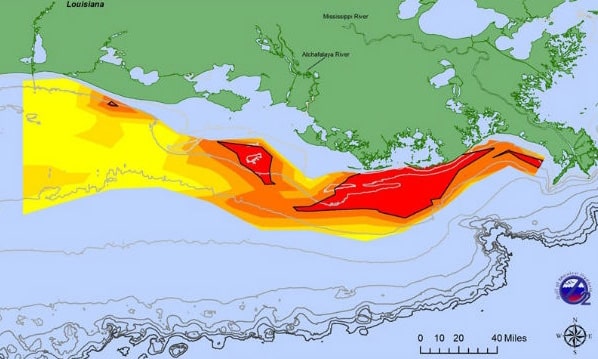FOR IMMEDIATE RELEASE
PRAIRIE RIVERS NETWORK CALLS ON ILLINOIS AG AND FOOD COMPANIES
TO BE GOOD STEWARDS OF ILLINOIS SOIL AND WATER
Contact: Jeff Kohmstedt, Prairie Rivers Network, jkohmstedt@prairierivers.org, 217-344-2371 ext. 207
CHAMPAIGN, IL – Prairie Rivers Network (PRN) calls on our Illinois-based food and agriculture companies to help the state reduce agricultural runoff and soil loss, which contribute to the Gulf of Mexico dead zone.
Today, the National Oceanic and Atmospheric Administration (NOAA) announced that this year’s Gulf of Mexico dead zone is 8,776 square miles, or roughly the size of New Jersey. A dead zone is an area where massive algal blooms use up oxygen when they decompose, killing off fish and other sealife. This year’s dead zone is the largest on record. Excessive nitrogen and phosphorus from agricultural runoff are to blame.

“Illinois is home to many of the leading global food and agricultural companies. These corporations have an important voice in efforts to protect water quality, keep our soils healthy, and protect people and wildlife,” PRN Executive Director, Carol Hays said. “Most grain and food companies have concerns about the sustainability of their supply chain, and we encourage Illinois-based companies to communicate those goals to suppliers and producers to help reduce input costs and protect valuable soils and local water quality. This is critical to ensure that Illinois communities have clean water for their economic vitality.”
The Illinois Nutrient Loss Reduction Strategy relies on voluntary adoption by farmers of practices like cover crops that promote soil health and hold nutrients in place, in the field and not in our rivers. To meet those goals, Illinois needs the help of the food production industry.
Approximately 20% of nitrates reaching the Gulf of Mexico come from Illinois, while only 7% of its water comes from the state. Runoff and nutrient loss is a major factor in the Gulf hypoxia zone, and Illinois is disproportionately responsible for it.
Incorporating cover crops to conserve soil is just one piece of the puzzle in protecting the water we drink and the habitat our wildlife depends on. Protecting our soil is also paramount to maintaining Illinois’ place as a food producing powerhouse.
“We call on these companies to encourage the farmers and producers they buy from to incorporate conservation practices where they can do the most good,” Hays said. “We need to apply these new practices that will protect the resources we all depend on — healthy soil and clean water.”
Prairie Rivers Network (PRN) is Illinois’ advocate for clean water and healthy rivers and is the Illinois affiliate of the National Wildlife Federation. PRN advocates for cultural values, policies and practices that sustain the ecological health and biological diversity of Illinois’ water resources and aquatic ecosystems. It is a member-supported, nonprofit organization that champions clean, healthy rivers and lakes and safe drinking water to benefit the people and wildlife of Illinois.
###







